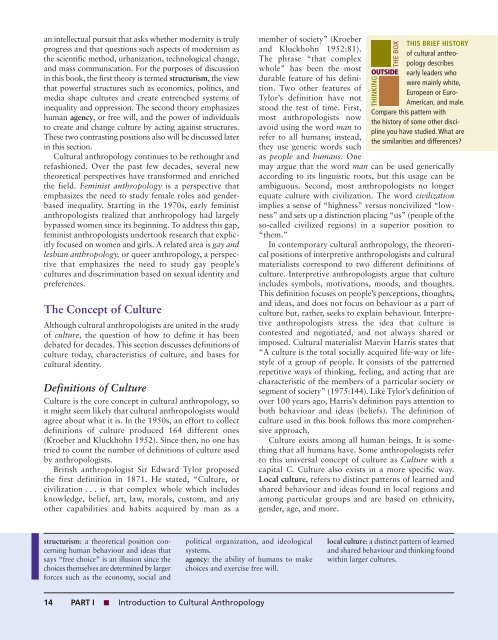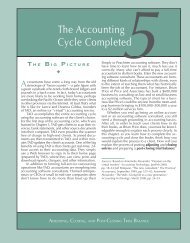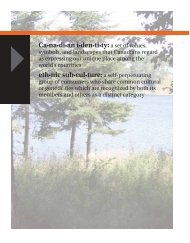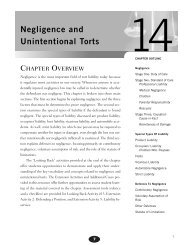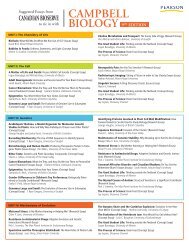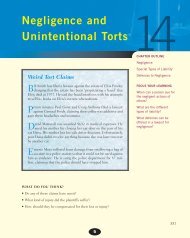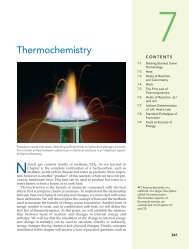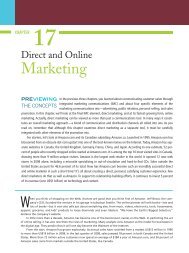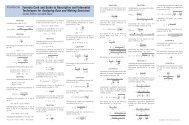PART Introduction to Cultural Anthropology - Pearson Canada
PART Introduction to Cultural Anthropology - Pearson Canada
PART Introduction to Cultural Anthropology - Pearson Canada
Create successful ePaper yourself
Turn your PDF publications into a flip-book with our unique Google optimized e-Paper software.
an intellectual pursuit that asks whether modernity is truly<br />
progress and that questions such aspects of modernism as<br />
the scientific method, urbanization, technological change,<br />
and mass communication. For the purposes of discussion<br />
in this book, the first theory is termed structurism, the view<br />
that powerful structures such as economics, politics, and<br />
media shape cultures and create entrenched systems of<br />
inequality and oppression. The second theory emphasizes<br />
human agency, or free will, and the power of individuals<br />
<strong>to</strong> create and change culture by acting against structures.<br />
These two contrasting positions also will be discussed later<br />
in this section.<br />
<strong>Cultural</strong> anthropology continues <strong>to</strong> be rethought and<br />
refashioned. Over the past few decades, several new<br />
theoretical perspectives have transformed and enriched<br />
the field. Feminist anthropology is a perspective that<br />
emphasizes the need <strong>to</strong> study female roles and genderbased<br />
inequality. Starting in the 1970s, early feminist<br />
anthropologists realized that anthropology had largely<br />
bypassed women since its beginning. To address this gap,<br />
feminist anthropologists under<strong>to</strong>ok research that explicitly<br />
focused on women and girls. A related area is gay and<br />
lesbian anthropology, or queer anthropology, a perspective<br />
that emphasizes the need <strong>to</strong> study gay people’s<br />
cultures and discrimination based on sexual identity and<br />
preferences.<br />
The Concept of Culture<br />
Although cultural anthropologists are united in the study<br />
of culture, the question of how <strong>to</strong> define it has been<br />
debated for decades. This section discusses definitions of<br />
culture <strong>to</strong>day, characteristics of culture, and bases for<br />
cultural identity.<br />
Definitions of Culture<br />
Culture is the core concept in cultural anthropology, so<br />
it might seem likely that cultural anthropologists would<br />
agree about what it is. In the 1950s, an effort <strong>to</strong> collect<br />
definitions of culture produced 164 different ones<br />
(Kroeber and Kluckhohn 1952). Since then, no one has<br />
tried <strong>to</strong> count the number of definitions of culture used<br />
by anthropologists.<br />
British anthropologist Sir Edward Tylor proposed<br />
the first definition in 1871. He stated, “Culture, or<br />
civilization . . . is that complex whole which includes<br />
knowledge, belief, art, law, morals, cus<strong>to</strong>m, and any<br />
other capabilities and habits acquired by man as a<br />
member of society” (Kroeber<br />
and Kluckhohn 1952:81).<br />
The phrase “that complex<br />
whole” has been the most<br />
durable feature of his definition.<br />
Two other features of<br />
Tylor’s definition have not<br />
s<strong>to</strong>od the test of time. First,<br />
most anthropologists now<br />
avoid using the word man <strong>to</strong><br />
refer <strong>to</strong> all humans; instead,<br />
they use generic words such<br />
as people and humans. One<br />
THIS BRIEF HISTORY<br />
of cultural anthropology<br />
describes<br />
OUTSIDE early leaders who<br />
were mainly white,<br />
European or Euro-<br />
American, and male.<br />
Compare this pattern with<br />
the his<strong>to</strong>ry of some other discipline<br />
you have studied. What are<br />
the similarities and differences?<br />
THINKING<br />
THE BOX<br />
may argue that the word man can be used generically<br />
according <strong>to</strong> its linguistic roots, but this usage can be<br />
ambiguous. Second, most anthropologists no longer<br />
equate culture with civilization. The word civilization<br />
implies a sense of “highness” versus noncivilized “lowness”<br />
and sets up a distinction placing “us” (people of the<br />
so-called civilized regions) in a superior position <strong>to</strong><br />
“them.”<br />
In contemporary cultural anthropology, the theoretical<br />
positions of interpretive anthropologists and cultural<br />
materialists correspond <strong>to</strong> two different definitions of<br />
culture. Interpretive anthropologists argue that culture<br />
includes symbols, motivations, moods, and thoughts.<br />
This definition focuses on people’s perceptions, thoughts,<br />
and ideas, and does not focus on behaviour as a part of<br />
culture but, rather, seeks <strong>to</strong> explain behaviour. Interpretive<br />
anthropologists stress the idea that culture is<br />
contested and negotiated, and not always shared or<br />
imposed. <strong>Cultural</strong> materialist Marvin Harris states that<br />
“A culture is the <strong>to</strong>tal socially acquired life-way or lifestyle<br />
of a group of people. It consists of the patterned<br />
repetitive ways of thinking, feeling, and acting that are<br />
characteristic of the members of a particular society or<br />
segment of society” (1975:144). Like Tylor’s definition of<br />
over 100 years ago, Harris’s definition pays attention <strong>to</strong><br />
both behaviour and ideas (beliefs). The definition of<br />
culture used in this book follows this more comprehensive<br />
approach.<br />
Culture exists among all human beings. It is something<br />
that all humans have. Some anthropologists refer<br />
<strong>to</strong> this universal concept of culture as Culture with a<br />
capital C. Culture also exists in a more specific way.<br />
Local culture, refers <strong>to</strong> distinct patterns of learned and<br />
shared behaviour and ideas found in local regions and<br />
among particular groups and are based on ethnicity,<br />
gender, age, and more.<br />
structurism: a theoretical position concerning<br />
human behaviour and ideas that<br />
says “free choice” is an illusion since the<br />
choices themselves are determined by larger<br />
forces such as the economy, social and<br />
political organization, and ideological<br />
systems.<br />
agency: the ability of humans <strong>to</strong> make<br />
choices and exercise free will.<br />
local culture: a distinct pattern of learned<br />
and shared behaviour and thinking found<br />
within larger cultures.<br />
14 <strong>PART</strong> I ■ <strong>Introduction</strong> <strong>to</strong> <strong>Cultural</strong> <strong>Anthropology</strong>


